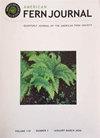New Leaves of Dryopteris intermedia Develop More Slowly When the Petioles of Overwintering Leaves are Broken
IF 0.9
4区 生物学
Q4 PLANT SCIENCES
引用次数: 0
Abstract
Abstract. Wintergreen ferns keep their leaves for an entire year before replacing them with new leaves in the spring. The overwintering leaves of Dryopteris intermedia provide carbon to the new leaves, and if these old leaves cannot become prostrate before winter via the hinge that develops at the base of the petiole, they are frost damaged and broken, which may affect the development of the new leaves in the subsequent year. I compared the vernal development of new leaves in D. intermedia between plants whose old leaves were intact and those whose petioles had been experimentally broken in the fall to determine the importance of the softening of the petiole-base in old leaves to the development of new leaves. Compared to the control, plants whose old leaves had broken petioles had a one-week delay in the development of their new leaves. This delay demonstrates that the evolutionary development of the petiole hinge may have been critical to the functional benefit associated with new leaf development in the wintergreen leaf habit in ferns.中间鳞毛蕨的新叶在越冬叶叶柄断裂时发育较慢
摘要冬绿色蕨类植物在春天用新叶子代替它们之前,会保留它们的叶子一整年。中间鳞毛蕨的越冬叶为新叶提供碳,如果这些老叶在冬季之前不能通过叶柄基部发育的铰链匍匐,它们就会被霜冻破坏,这可能会影响下一年新叶的发育。我比较了中间D.intermedia新叶的春季发育情况,这些植物的老叶完好无损,叶柄在秋季被实验性折断,以确定老叶叶柄基部软化对新叶发育的重要性。与对照相比,老叶叶柄断裂的植物新叶的发育延迟了一周。这一延迟表明,叶柄铰链的进化发育可能对蕨类植物越冬叶习性中与新叶发育相关的功能益处至关重要。
本文章由计算机程序翻译,如有差异,请以英文原文为准。
求助全文
约1分钟内获得全文
求助全文
来源期刊

American Fern Journal
生物-植物科学
CiteScore
1.20
自引率
0.00%
发文量
28
审稿时长
6 months
期刊介绍:
The American Fern Journal is a peer-reviewed journal focused on the biology of ferns and lycophytes.
 求助内容:
求助内容: 应助结果提醒方式:
应助结果提醒方式:


